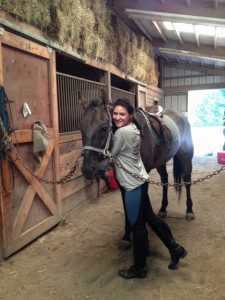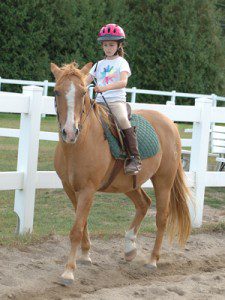by Andrea Bugbee
SOUTHWICK – Families from greater Springfield and Hartford now have an uncommon, effective resource available to them as they care for their loved ones with disabilities. Under the professional direction of Christina Strain, a licensed Mass. and Conn. psychiatric social worker and certified special education teacher, Southwick’s Strain Family Equestrian Center has begun offering therapeutic horseback riding for clients who are physically, emotionally, and/or cognitively impaired.
“Therapeutic riding takes away limitations,” said Strain, who has owned and operated the Strain Family Equestrian Center with her husband, Bill, since 1998. “What people can’t do on the ground, oftentimes they can do on a horse. If you can have that sense of controlling a 1,000 pound animal, what an accomplishment.”
Specific research into the efficacy of therapeutic riding shows that the movement of horseback riding provides sensory stimulation to the rider’s body and brain, affecting a variety of muscle groups. One study carried out by the University of Brighton in partnership with Plumpton College in East Sussex, UK, determined that horseback riding stimulates mainly positive psychological feelings, and the passive use of the horse’s physical movements helps riders with neurological disabilities to enhance balance and coordination. Research from the College of William and Mary found that consistent therapeutic riding lessons, over time, maintain positive emotional and physical benefits.
“This is very much a wrap-around type of service,” noted Strain, who explained that each client’s initial intake includes a medical history, as well as all relevant consultations with occupational therapists, physical therapists, school counselors, and/or other professional advisors.
Next, Strain couples her equine expertise with her skills as a psychiatric social worker and equine facilitated psychotherapist to match her clients to a suitable mount. Massachusetts licensed riding instructors, who are additionally certified under the rigorous Professional Association of Therapeutic Horsemanship (PATH) standards, teach all lessons. Small teams of trained volunteers lead the horse and walk beside each rider for safety.
According to Strain, animals are uniquely suited for therapeutic purposes because they are welcoming and interactive. “Animals are tolerant of people,” she said. “They’re more accepting. They’re non-judgmental. They’re willing to connect with people.” Studies indicate that riders are motivated to take part in their sport by the sense of well-being they gain from interacting with horses. This uplifting psychological contact with an animal occurs in a very few sports.
“These riders can develop a bond with the horses,” Strain explained. “That can be really helpful in building relationship skills for someone who has difficulties in that area.”
The Strain Family Equestrian Center is a full service stable which prides itself on offering a breadth of professional equine services within a fun, family-centered atmosphere. Facilities include an indoor riding arena, two outdoor riding rings, a heated viewing lounge, and 70 acres of land rich with trails.
“We’re unique in the sense that we run a traditional stable with boarding, training, and lessons, but we also offer equine facilitated psychotherapy and, now, therapeutic riding for people with physical and cognitive disabilities,” remarked Strain.
Because the Strain family also operates Granby, Connecticut’s Strain Family Horse Farm, which is one of the largest horse sales stables in New England, access to suitable school and therapy horses is virtually unlimited.
“Horses can enjoy therapeutic riding just like the riders do, but they’ll tell you when they’re not comfortable. If they’re not, we can replace them,” Strain said. “We’re lucky in that, for the most part, our horses are all show horses with a ton of training behind them. They’re well-mannered. They’re just good, quality horses.”
“The riding is therapeutic,” she said. “but it doesn’t feel like it. For the riders, it’s just fun.”



